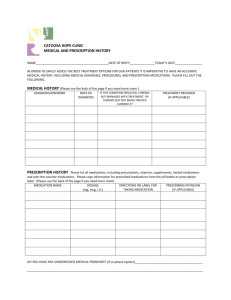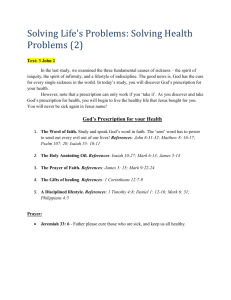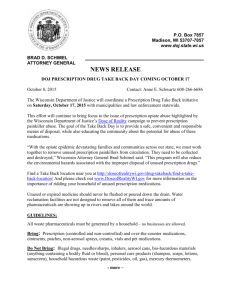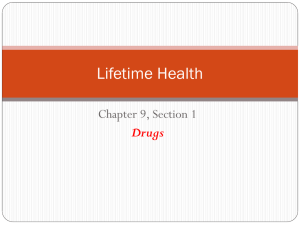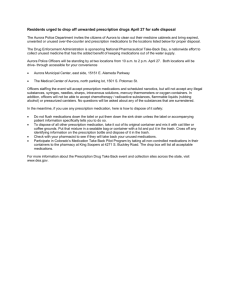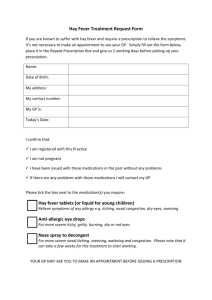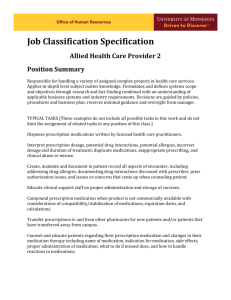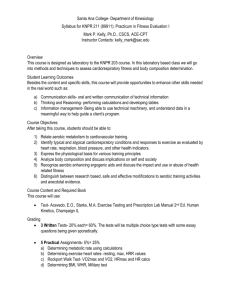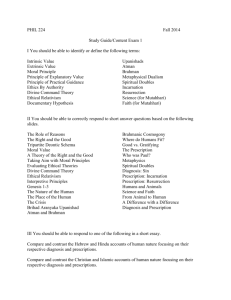CPxR - Smart Policing Initiative
advertisement
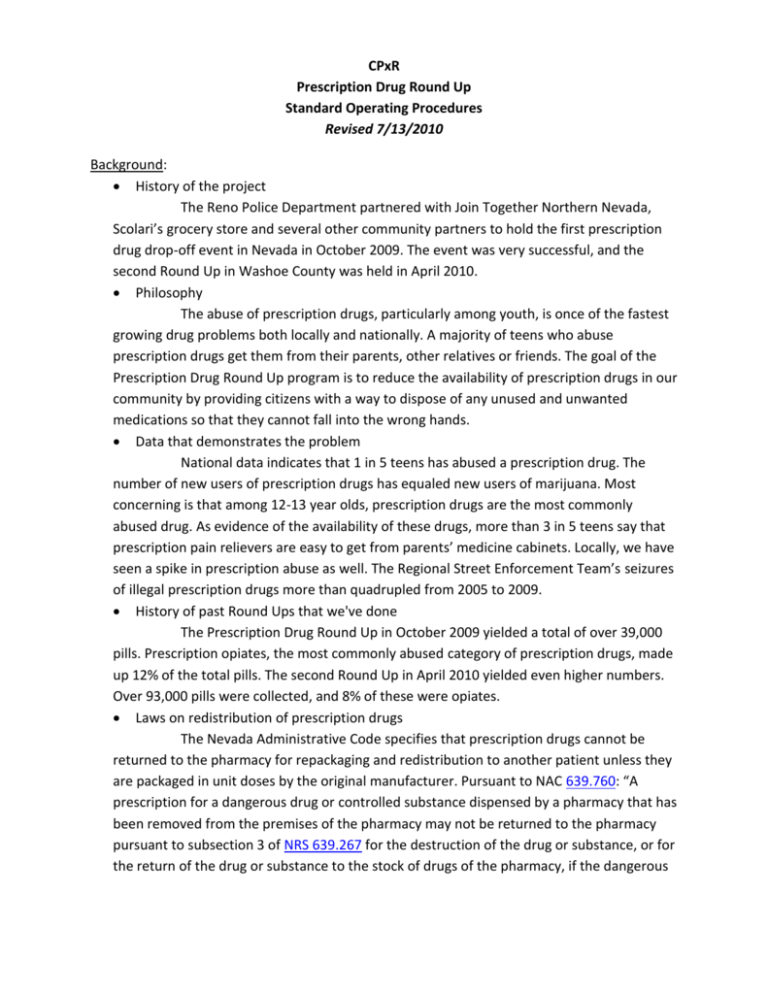
CPxR Prescription Drug Round Up Standard Operating Procedures Revised 7/13/2010 Background: History of the project The Reno Police Department partnered with Join Together Northern Nevada, Scolari’s grocery store and several other community partners to hold the first prescription drug drop-off event in Nevada in October 2009. The event was very successful, and the second Round Up in Washoe County was held in April 2010. Philosophy The abuse of prescription drugs, particularly among youth, is once of the fastest growing drug problems both locally and nationally. A majority of teens who abuse prescription drugs get them from their parents, other relatives or friends. The goal of the Prescription Drug Round Up program is to reduce the availability of prescription drugs in our community by providing citizens with a way to dispose of any unused and unwanted medications so that they cannot fall into the wrong hands. Data that demonstrates the problem National data indicates that 1 in 5 teens has abused a prescription drug. The number of new users of prescription drugs has equaled new users of marijuana. Most concerning is that among 12-13 year olds, prescription drugs are the most commonly abused drug. As evidence of the availability of these drugs, more than 3 in 5 teens say that prescription pain relievers are easy to get from parents’ medicine cabinets. Locally, we have seen a spike in prescription abuse as well. The Regional Street Enforcement Team’s seizures of illegal prescription drugs more than quadrupled from 2005 to 2009. History of past Round Ups that we've done The Prescription Drug Round Up in October 2009 yielded a total of over 39,000 pills. Prescription opiates, the most commonly abused category of prescription drugs, made up 12% of the total pills. The second Round Up in April 2010 yielded even higher numbers. Over 93,000 pills were collected, and 8% of these were opiates. Laws on redistribution of prescription drugs The Nevada Administrative Code specifies that prescription drugs cannot be returned to the pharmacy for repackaging and redistribution to another patient unless they are packaged in unit doses by the original manufacturer. Pursuant to NAC 639.760: “A prescription for a dangerous drug or controlled substance dispensed by a pharmacy that has been removed from the premises of the pharmacy may not be returned to the pharmacy pursuant to subsection 3 of NRS 639.267 for the destruction of the drug or substance, or for the return of the drug or substance to the stock of drugs of the pharmacy, if the dangerous drug or controlled substance is not packaged in a unit dose by its original manufacturer as required by subsection 1.” Planning: DEA Letter of permission In accordance with CFR 21 – 1307.21 and 1307.24 (attached), any law enforcement agency planning to hold a prescription drug take-back event may first submit a written request for assistance from the Special Agent in Charge of the Drug Enforcement Administration in the area in which the person is located for authority and instructions to dispose of such substances. Specifics of the necessary request are outlined in the attached documents (attachments 1 and 2). Choose date, sites A date for the event to be held should be selected, ideally at least 2 months in advance to allow sufficient time for advertisement, sign up of volunteers, and other planning and logistics. The Round Up events in Reno/Sparks in 2009 and 2010 each had five sites, staffed for 4-5 hour periods on a Saturday. Enlist partners Potential community partners may include, but are not limited to: law enforcement agencies, non-profit groups, city or county health and water departments, school districts, universities, pharmacies/grocery stores, and others. Develop flyers and advertisement Flyers advertising the event may be placed at each drop off location, as well as at the offices of any partnering agencies. A sample flyer from the Reno/Sparks Round Up event is attached (attachment 3). Other forms of advertisement can include newspaper, radio, television, billboards, etc. depending upon the available funding and resources of the partnering agencies. Standards in terms of uniformed, DRE trained officers, etc. Each collection site must be staffed by at least one sworn, uniformed law enforcement officer. The officer(s) must maintain possession of the substances at all times, and are responsible for the proper transportation of the drugs and destruction upon conclusion of the event. Reno/Sparks Round Up events have been staffed with 1-2 uniformed officers per site, many of whom are certified DRE officers. Who to recruit for greeters Sites may be staffed with civilian volunteer “greeters.” Greeters may include volunteers from the partnering agencies, as well as any other interested individuals. Possible ideas for additional greeters include college students, law enforcement agency volunteers, and other community service organization volunteers. Pharmacist volunteers In addition to officers and civilian greeters, event planners may request the assistance of volunteering pharmacists for identification, counting and logging of pills. The April 2010 Reno/Sparks Round Up event staffed each site with at least two pharmacists, who assisted the officer in identification, counting and logging of all prescription medications collected. Briefing for officers Participating officers should be briefed prior to the event on proper collection procedures, logging of pills, booking of evidence, security protocols, and any other pertinent issues, to ensure proper compliance with regulations as well as consistency of procedures throughout the sites. Materials boxes Event planners may create a materials box for each site prior to the event, which will include all necessary materials for the greeters, officers and pharmacists. Materials to be included will vary depending on the nature of each event and resources available. A sample materials inventory from the Reno/Sparks Round Up is attached. Log sheet All medications collected should be tracked on a log form, which will then be submitted along with the pills when they are booked into evidence. The degree of detail to be included in the log may vary, and should be discussed with the participating DEA office prior to the event to ensure compliance with federal regulations. In addition, the pill log allows event planners to analyze the data after the event and collect information such as what types of prescription medications are most popular, etc. A sample log form from the Reno/Sparks Round Up event is attached. The Event: Role of greeters and what they will say when people approach the table; what info do we want the greeters to provide? The responsibility of the greeter is to speak to members of the public that attend the event, collect their medications, provide them with any brochures/gift cards/etc. that are being given away, and answer any questions. Greeters should handle all liaison duties with the public, so that the officers and pharmacists may focus on collection and logging of medications. Event planners may also decide to have the greeters ask questions of those dropping off medications, such as how they heard about the event, why they decided to participate, etc. What will be accepted and what won't be accepted; what to do with illicit drugs Per DEA regulations (CFR 21 – 1307.21), illicit drugs may not be collected as a part of the prescription drug take-back event. Participating law enforcement agencies should determine protocol in the event that a citizen brings illicit drugs to the event. Event planners should decide prior to the event whether over-the-counter drugs will be collected in addition to prescription drugs. Planners should also decide whether to accept sharps, liquids, and pet medications. Storing used Sharps Citizens may bring new or used sharps to the event, with or without a sharps container. Each site should have either a plastic sharps container or another sturdy container for collecting sharps. Sharps should be handled with care, and should only be handled by the law enforcement officer at the site. Identifying information on pill bottles Citizens may bring their pills in the original prescription bottles with their names on the label. Greeters may offer to black out any identifying patient information on the bottle with a permanent marker, if the citizen is concerned about privacy. Whether this is completed or not, all pill bottles should be either taken back to the police station with the medications and then recycled, or taken directly to the recycling center and immediately destroyed, to eliminate any chance of theft of the patient bottles. Literature offers from greeters The Reno/Sparks Round Up events provided a wide variety of materials for the public relating to prescription drug abuse. These included: brochures for parents, information sheets, magnets, bookmarks, medication tracking cards, and other items. Other giveaways (coupons, DVD’s, MedSafes, etc.) The Reno/Sparks Round Up events offered certain items as free gifts to citizens who dropped off medications. At the first event this included gift certificates from our site host, Scolari’s grocery store. Partnering agencies and companies may be willing to offer free incentives to the public at the event. The second Reno/Sparks event offered prescription drug abuse DVD’s which were produced by the school district, as well as MedSafe locking medicine cabinets (to the first 15 people at each site), which were purchased by the Reno Police Department. Counting the drugs Pharmacist volunteers (if available) may assist the law enforcement officers in the identification, counting and logging of prescription medications collected. The degree of detail to which medications are logged should be discussed with the participating DEA office prior to the event. Pill counters from pharmacies can be extremely helpful in this process. In addition, many citizens may bring pills which are not in the original bottles. Some useful tools for pill identification are www.drugs.com, if internet access is available, and the Epocrates app for iPhone. How to utilize evidence bags/garbage bags All prescription medications collected will need to be placed into evidence bags, so that they can later be booked into evidence for destruction by the participating law enforcement agency. In the Reno/Sparks Round Up events, all pills were dumped from containers and collected together in evidence bags, including over-the-counter pills. All prescription bottles were collected in a garbage bag for recycling, and prescription liquids and their containers in a separate garbage bag. The procedure for destruction and recycling of all pertinent materials will vary by location and department, and each participating law enforcement agency should consult existing department protocols to ensure compliance. Chain of custody Per federal regulations, all prescription medications collected must remain in the possession of a law enforcement officer at all times. Upon conclusion of the event, officers at each site should transport the collected items back to the police station so that they can be compiled and booked into evidence. Aftermath: Disposal of drugs The Reno Police Department maintained a log of all prescription medications collected, and this log was booked into evidence along with the drugs, per department policy. These drugs were then disposed of according to department procedure for destruction of illicit narcotics. Each department should follow its existing procedures for destruction of narcotics. Data analysis Upon conclusion of the Prescription Drug Round Up events, the Reno Police Department compiled the logs of pills collected at all sites in order to analyze the data. Pills were divided into four categories: opiates, CNS depressants, CNS stimulants, and other. This allows for tracking of what types of prescription drugs are being collected, and how this is changing over time. The results of this analysis are then presented to the group of community partners organizing the Round Ups. Press release As soon as possible after the Round Up event, the Reno Police Department issued a press release containing the total number and weight of pills collected at the event. Recycling Sharps and med containers In order to handle all pill bottles, sharps, liquids and other hazardous materials collected, the Reno Police Department contacted Waste Management, who agreed to accept and subsequently recycle or destroy these materials. Each department is advised to contact its local waste management company prior to the event to determine the proper method for handling of these materials. Contact Information: Reno Police Department Sergeant Mac Venzon 334-3061 venzonb@reno.gov Stacy Shamblin 657-4794 shamblins@reno.gov Join Together Northern Nevada Kevin Quint 324-7557 kquint@jtnn org Attachment 1: CFR 21- 1307.21 Attachment 2: CFR 21- 1307.24 Attachment 3: Sample Round Up Event Flyer Attachment 4: Sample Materials List Attachment 5: Sample Pill Log
